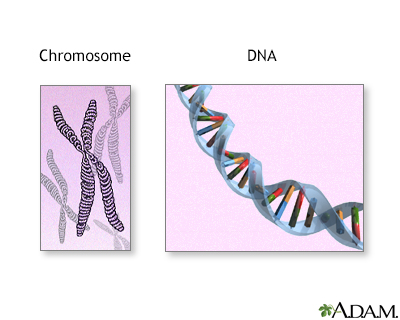Familial dysautonomia
Riley-Day syndrome; FD; Hereditary sensory and autonomic neuropathy - type III (HSAN III); Autonomic crises - familial dysautonomia
Familial dysautonomia (FD) is an inherited disorder that affects nerves throughout the body.
Images

I Would Like to Learn About:
Causes
FD is passed down through families (inherited). A person must inherit a copy of the defective gene from each parent to develop the condition.
FD occurs most often in people of Eastern European Jewish ancestry (Ashkenazi Jews). It is caused by a change (mutation) to a gene. It is rare in the general population.
Symptoms
FD affects the nerves in the autonomic (involuntary) nervous system. These nerves manage daily body functions such as blood pressure, heart rate, sweating, bowel and bladder emptying, digestion, and the senses.
Symptoms of FD are present at birth and may grow worse over time. Symptoms vary, and may include:
- Swallowing problems in infants, resulting in aspiration pneumonia or poor growth
- Breath-holding spells, resulting in fainting
- Constipation or diarrhea
- Inability to feel pain and changes in temperature (can lead to injuries)
- Dry eyes and lack of tears when crying
- Poor coordination and unsteady walk
- Seizures
- Unusually smooth, pale tongue surface and lack of taste buds and decrease in sense of taste
After age 3, most children develop autonomic crises. These are episodes of vomiting with very high blood pressure, racing heart, fever, and sweating.
Exams and Tests
The health care provider will do a physical exam to look for:
- Absent or decreased deep tendon reflexes
- Lack of a response after receiving a histamine injection (usually redness and swelling would occur)
- Lack of tears with crying
- Low muscle tone, most often in babies
- Severe curving of the spine (scoliosis)
- Tiny pupils after receiving certain eye drops
Blood tests are available to check for the gene mutation that causes FD.
Treatment
FD can't be cured. Treatment is aimed at managing the symptoms and may include:
- Medicines to help prevent seizures
- Feeding in an upright position and giving textured formula to prevent gastroesophageal reflux (stomach acid and food coming back up, also called GERD)
- Measures to prevent low blood pressure when standing, such as increasing intake of fluid, salt, and caffeine, and wearing elastic stockings
- Medicines to control vomiting
- Medicines to prevent dry eyes
- Physical therapy of the chest
- Measures to protect against injury
- Providing enough nutrition and fluids
- Surgery or spinal fusion to treat spine problems
- Treating aspiration pneumonia
Outlook (Prognosis)
Advances in diagnosis and treatment are increasing the survival rate. About one half of babies born with FD will live to age 30.
When to Contact a Medical Professional
Contact your provider if symptoms change or get worse. A genetic counselor can help teach you about the condition and direct you to support groups in your area.
Prevention
Genetic DNA testing is very accurate for FD. It may be used for diagnosing people with the condition or those who carry the gene. It can also be used for prenatal diagnosis.
People of Eastern European Jewish background and families with a history of FD may wish to seek genetic counseling if they are thinking of having children.
Related Information
Autosomal recessiveReferences
Ryan MM. Autonomic neuropathies. In: Kliegman RM, St. Geme JW, Blum NJ, Shah SS. Tasker RC, Wilson KM, eds. Nelson Textbook of Pediatrics. 21st ed. Philadelphia, PA: Elsevier; 2020:chap 633.
Wapner RJ, Dugoff L. Prenatal diagnosis of congenital disorders. In: Resnik R, Lockwood CJ, Moore TR, Greene MF, Copel JA, Silver RM, eds. Creasy and Resnik's Maternal-Fetal Medicine: Principles and Practice. 8th ed. Philadelphia, PA: Elsevier; 2019:chap 32.
BACK TO TOPReview Date: 11/18/2022
Reviewed By: Elika Hoss, MD, Assistant Professor of Dermatology, Mayo Clinic, Scottsdale, AZ. Also reviewed by David C. Dugdale, MD, Medical Director, Brenda Conaway, Editorial Director, and the A.D.A.M. Editorial team.

Health Content Provider
06/01/2025
|
A.D.A.M., Inc. is accredited by URAC, for Health Content Provider (www.urac.org). URAC's accreditation program is an independent audit to verify that A.D.A.M. follows rigorous standards of quality and accountability. A.D.A.M. is among the first to achieve this important distinction for online health information and services. Learn more about A.D.A.M.'s editorial policy, editorial process and privacy policy. A.D.A.M. is also a founding member of Hi-Ethics. This site complied with the HONcode standard for trustworthy health information from 1995 to 2022, after which HON (Health On the Net, a not-for-profit organization that promoted transparent and reliable health information online) was discontinued. |
The information provided herein should not be used during any medical emergency or for the diagnosis or treatment of any medical condition. A licensed medical professional should be consulted for diagnosis and treatment of any and all medical conditions. Links to other sites are provided for information only -- they do not constitute endorsements of those other sites. © 1997- 2024 A.D.A.M., a business unit of Ebix, Inc. Any duplication or distribution of the information contained herein is strictly prohibited.
